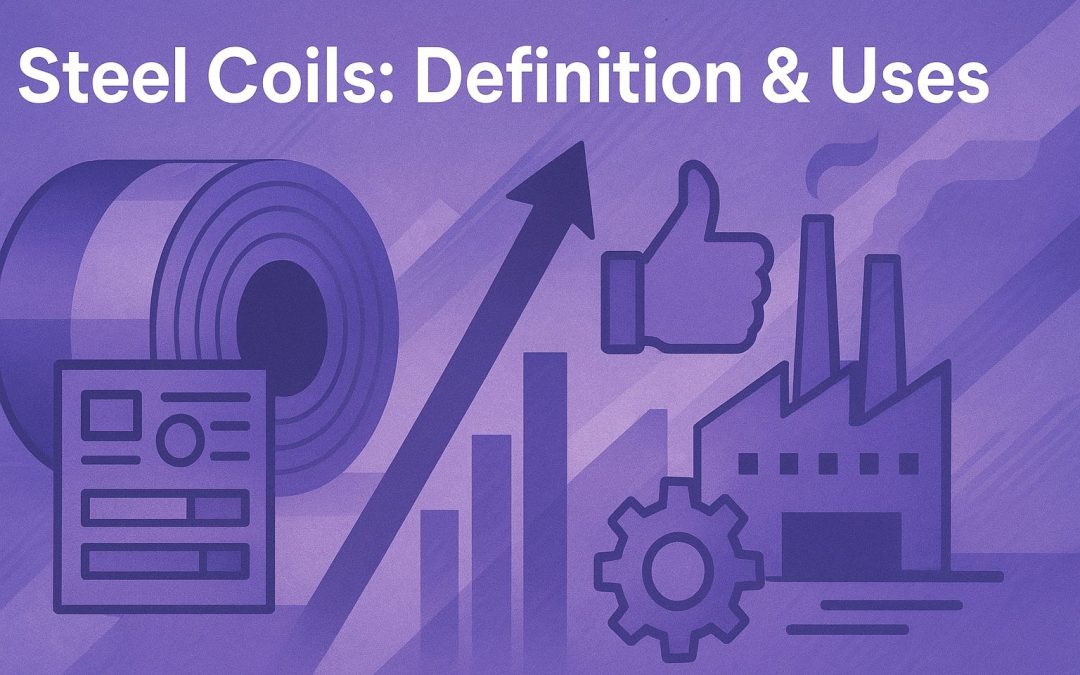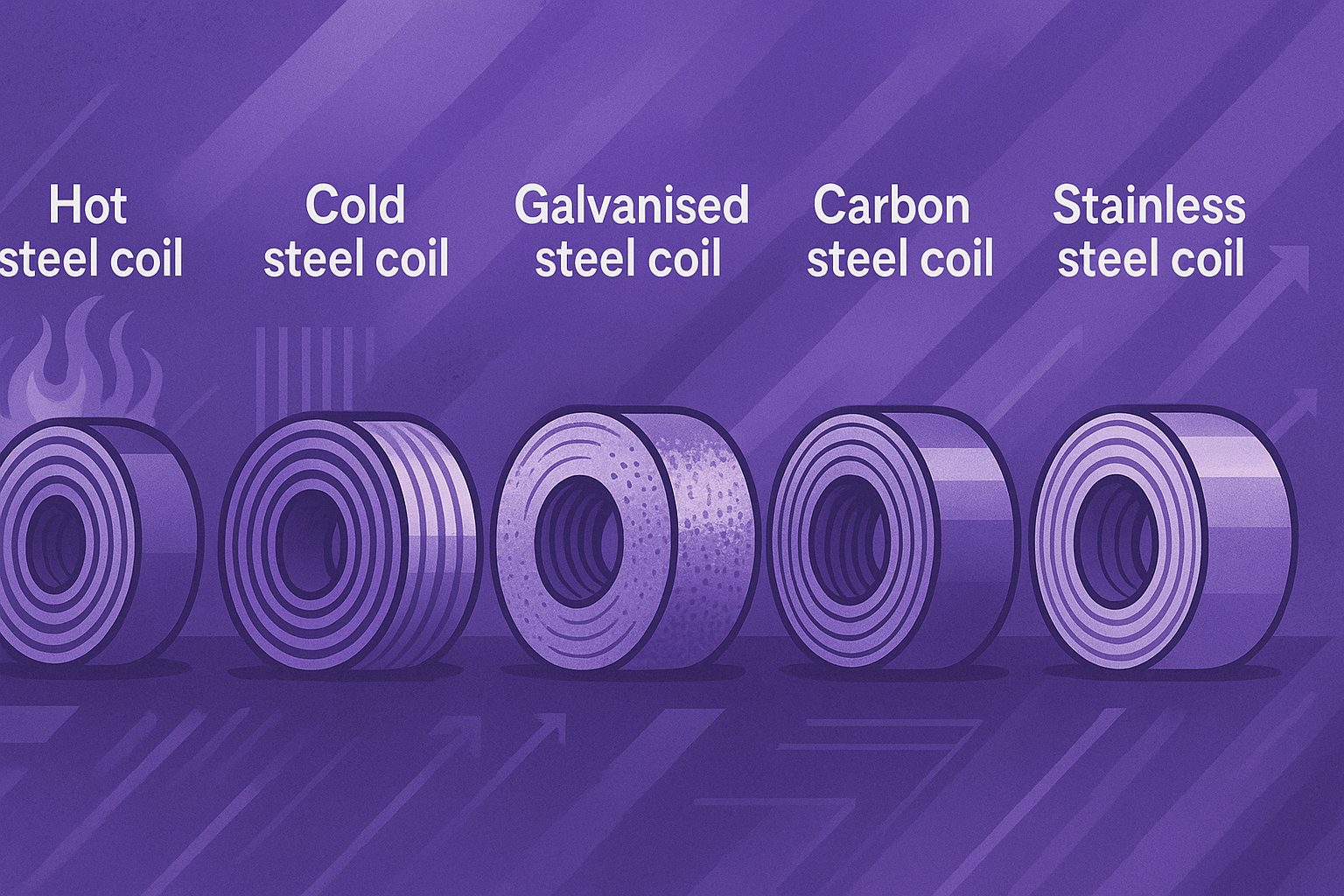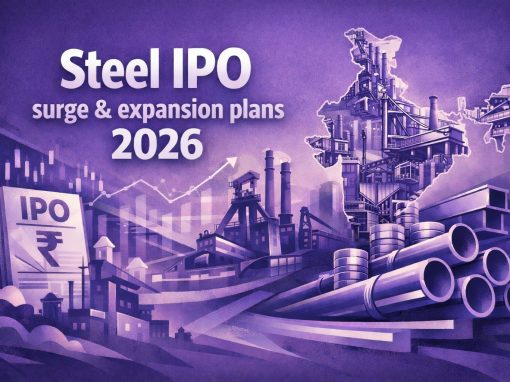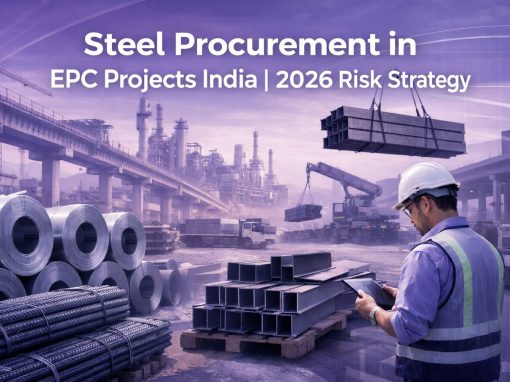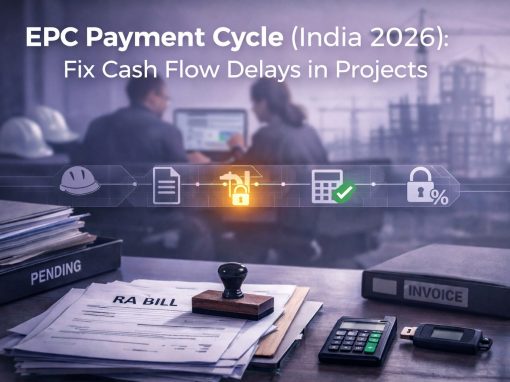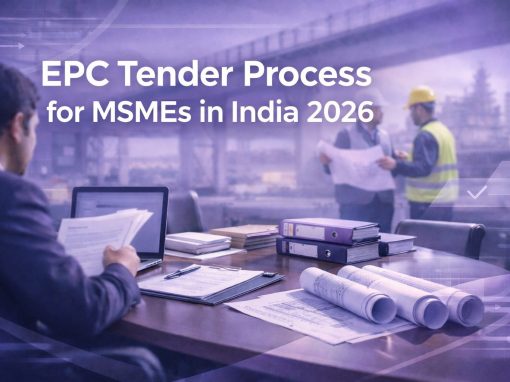Table of Contents
Steel is an important commodity for manufacturing, engineering and construction industry. It became popular due to its high tensile strength, flexibility, and low cost. Steel is most widely used in the form of steel coil made from steel slabs. There are various grades or classifications of steel coils and used across industries for a myriad of functions. These coils are made by hot rolling, cold rolling, or by using the Electrolytic Tinplate (ETP) method.
The quality of steel coils depends on the grade of steel you choose. Depending on the grades of steel, coiled steel will have different mechanical properties and specific chemistry. There are about 3500 steel grades with various physical, chemical and mechanical features that have been developed around the world. Steel coils are therefore chosen based on the specific uses of a company.
For example, a car manufacturer uses Advanced High-strength Steels (AHSS) while the construction industry usually utilises Fe 415 and Fe 500 grades of steel.
Coil meaning: A length of wire or rope arranged in a series of circles one above the other. The process of this arrangement is called coiling. Metals are often drawn out into sheets and made into metal coils for use in industries. Like coil steel these coils are also used according to their chemical and mechanical properties. Aluminium coils are one of the most used among metal coils after steel coils.
Let us take a closer look at the meaning of steel coils and their classifications, and the use of steel coils in industries.
Steel Coil Definition and Benefits
Steel coil is defined as sheet or strip of steel that is wound or coiled after rolling. It is manufactured by placing a slab into a continuous rolling machine to reduce its thickness until it forms a sheet. This sheet is then wound into coils.
• Durability
• Excellent heat resistance
• Low maintenance
• Safe to use
• Affordable
Uses of Steel Coils
Steel coils can be formed into any shape and are often used along with other materials to create specific shapes. Coiled steel is used for a variety of applications including building components, machinery and electrical equipment, kitchen appliances, etc.
Some of the widely known steel coil uses include:
Manufacture of Automotive Parts
Automotive parts including the shell of the vehicle, chassis, suspension, rims, exhaust system, etc., are made of steel. Durability, heat resistance, high strength-to-weight ratio and non-combustibility of steel coils make them the ideal choice for an automobile engine.
Electronic Components
Computers, smartphones, circuit boards, etc., are made of steel coils. Since steel has a high melting point it is apt for use in making electronic goods. Steel also contributes to electrical devices being cost-effective.
Pipe Manufacturing
Steel rolling machines have allowed pipes to be continuously rolled into long pipelines without the need of welding pipes together to form a long pipeline. These are used as gas pipelines and in the construction of houses for heating, plumbing, etc.
Railroads
Railroads use carbon steel coils due to their high flexibility. It has the ability to expand without changing shape, making it suitable for train wheels running on railway tracks.
Considering the wide range of steel coil use, procurement of steel as a raw material has always been vital for businesses. Today, steel coils can be purchased online that gives businesses the option to compare prices, delivery timelines, quality, and other details before purchase. Tata nexarc’s Procurement is one such place where you can buy steel online at competitive prices hassle-free.
Also Know: Latest Steel price in India Today
Types of Steel Coils and Their Applications
Steel coils come in various types, each designed to meet different industrial needs. Understanding the properties and uses of each type can help you choose the right material for your business.
Hot Rolled Steel Coils
Hot rolled steel coils are produced at high temperatures, making them easier to form and shape. They have a rough surface finish and are commonly used where precise dimensions are not essential.
Applications: Construction beams, railway tracks, machinery frames, and automotive chassis.
Approximate price: ₹55,000–₹60,000 per ton (as of 2025).
Cold Rolled Steel Coils
Cold rolled coils are made by re-rolling hot rolled steel at room temperature to achieve a smooth surface and accurate thickness. They have better strength and finish compared to hot rolled coils.
Applications: Home appliances, automotive body panels, furniture, and precision parts.
Approximate price: ₹65,000–₹75,000 per tonne (as of 2025).
Galvanised Steel Coils
Galvanised steel coils are coated with zinc to prevent rust and corrosion, making them ideal for outdoor and moisture-prone environments. They are available in various thicknesses and finishes.
Applications: Roofing sheets, wall panels, electrical fittings, and outdoor structures.
Approximate price: ₹70,000–₹80,000 per ton (as of 2025).
Carbon Steel Coils
Carbon steel coils contain varying levels of carbon, offering high strength and hardness. They are durable and suitable for heavy-duty applications but may require coating for corrosion resistance.
Applications: Pipelines, pressure vessels, and mechanical components.
Approximate price: ₹60,000–₹70,000 per ton (as of 2025).
Stainless Steel Coils
Stainless steel coils contain chromium, which gives them excellent corrosion and heat resistance. They also have a bright, polished finish, making them both functional and visually appealing.
Applications: Food processing equipment, kitchenware, chemical plants, and medical instruments.
Approximate price: ₹180,000–₹220,000 per ton (as of 2025).
Each steel coil type serves a unique purpose depending on its properties, cost, and finish. Choosing the right one helps ensure long-lasting performance and cost efficiency for your business.
How to Choose the Right Steel Coil
Selecting the right steel coil is essential for maintaining product quality and efficiency. Each type of coil offers different strengths, finishes, and sizes suited to specific applications. The table below highlights key factors to consider before making your purchase.
| Factor | What It Means | Why It Matters |
| Steel grade | Refers to the composition and strength of the steel. | Choosing the right grade ensures the material meets your product’s strength and durability needs. |
| Surface finish | The texture or coating on the coil’s surface. | Affects appearance, corrosion resistance, and suitability for painting or galvanising. |
| Coil width and thickness | Dimensions of the steel coil used in production. | Matching these to your manufacturing needs reduces material waste and improves efficiency. |
| Supplier reliability | Trustworthiness and performance of the supplier. | Ensures consistent quality, timely delivery, and competitive pricing for your business. |
Top Steel Coil Manufacturers and Suppliers in India
For MSMEs in India, sourcing steel coils from reliable local manufacturers and verified suppliers is crucial for ensuring consistent quality, timely supply, and cost efficiency. The points below highlight key aspects of the Indian steel coil supply landscape and procurement options:
Leading Manufacturers
Tata Steel – Offers a wide range of hot rolled, cold rolled, and galvanised steel coils used in construction, automotive, and fabrication industries.
JSW Steel – Known for advanced manufacturing technology and high-quality coated steel coils.
SAIL (Steel Authority of India Limited) – Supplies durable hot rolled and cold rolled coils across sectors including railways and heavy engineering.
Jindal Steel and Power – Produces carbon and stainless-steel coils ideal for industrial and infrastructure applications.
Digital Steel Coil Procurement Solutions
Platforms such as Tata nexarc enable MSMEs to buy steel coils online from verified suppliers across India.
Businesses can compare prices, check availability, and choose specifications (grade, thickness, finish) suited to their production needs. Tata nexarc also provides credit facilities, secure payments, and pan-India delivery, reducing the burden of traditional offline sourcing.
Benefits for MSMEs:
- Access to quality steel coils at competitive prices.
- Improved transparency and convenience.
- Stronger supplier network and reduced operational delays.
By leveraging digital platforms and trusted Indian steel manufacturers, MSMEs can optimise their procurement process, ensure consistent supply, and strengthen their competitiveness in the market.
Conclusion
Steel coils are a versatile and essential material used across various industries due to their durability, heat resistance, and affordability. The process of manufacturing steel coils, whether through hot rolling, cold rolling, or other methods, allows them to meet the specific mechanical, chemical, and physical requirements for different applications. From automotive parts to electronics and infrastructure, steel coils play a pivotal role in driving manufacturing efficiency. By understanding the different types of steel coils, such as hot rolled, cold rolled, and galvanized steel coils, businesses can make informed decisions about the best material for their needs. With the option to purchase steel coils online, procurement has become more streamlined, offering businesses competitive prices and convenient access to high-quality materials.
Also Read on:
Aluminium Coil, Colour coated steel coil, Stainless steel coil.
Looking to procure steel?
Tata nexarc helps manufacturers, builders and MSMEs source certified steel products, compare prices, and choose the right grade as per IS codes—with complete traceability and procurement confidence.
FAQs:
Priyanka is a seasoned content marketing professional with more than 6 years of experience crafting various forms of business and technology sector content. Her insightful writing tackles critical issues faced by small-scale manufacturing businesses. Priyanka's clear and concise communication empowers businesses to make informed decisions and thrive in today's dynamic business environment.
